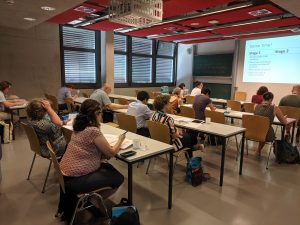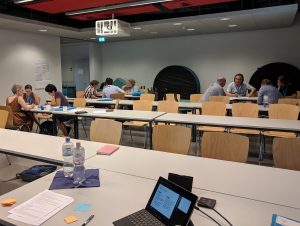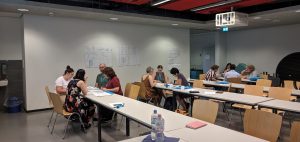Last week I received a beautiful email from a former student. It gives a specific example of how the way in which a teacher responds can impact a student’s well-being into the future. In case it would be helpful to others, I asked the student if I could post their memory, anonymously, and they agreed. (Thanks!)
Although I do not have you as a professor this year, I have been blessed to have you in my first and second year. You taught me 101 as well as 217. As a [peer mentor] this year, I have tried to relay your “this test does not define you” mentality to the first year students I see every day. Now, I always recall your encouraging and reassuring mantra before I bubble in my first multiple choice, or read the first question of an exam.
One particular memory that may have been minuscule to you, but was so impactful for me, was before the 217 final last year. About ten minutes into the final, I heard a very soft ringtone in my vicinity, and was so irritated–so I asked you to address everyone in my area to take out their phones. Little did I know, it was my own phone I had “snoozed” the alarm for. I was so incredibly embarrassed and on the verge of tears– you had every right to firmly humble me, but rather, you calmly said,
“it’s okay, take a deep breath…You are okay.”
And that is what I did. What could have been a terrible final turned into a lesson to always turn off my phone, but also to reframe my worry. So often the worry I feel is so imperative one moment, will turn into tomorrow’s laughter.
So, thank you. I know you have done work regarding effectively teaching large classes, so as a student from two of your large classes, please know your impact goes beyond your curriculum. You have taught me how to reframe my worry, take deep breaths, and view learning as something to be excited about, rather than a module I have to master.
I replied,
Wow! I have tears in my eyes! Thank you so very much for reaching out and taking the time to share this story. You’re right — I don’t remember that moment! I am so very relieved that what I said that split second made a positive difference for you. And what a gift for me to hear about it a year later. This story helps me remember to keep deliberately adding these comments because they can really help people!
I’m reminded of a recent commentary I read about A Pedagogy of Kindness (https://hybridpedagogy.org/pedagogy-of-kindness/), as well as the beautiful wisdom of Maya Angelou: “I’ve learned that people will forget what you said, people will forget what you did, but people will never forget how you made them feel.”
We teach more than content, folks. So much more.

 Follow
Follow


